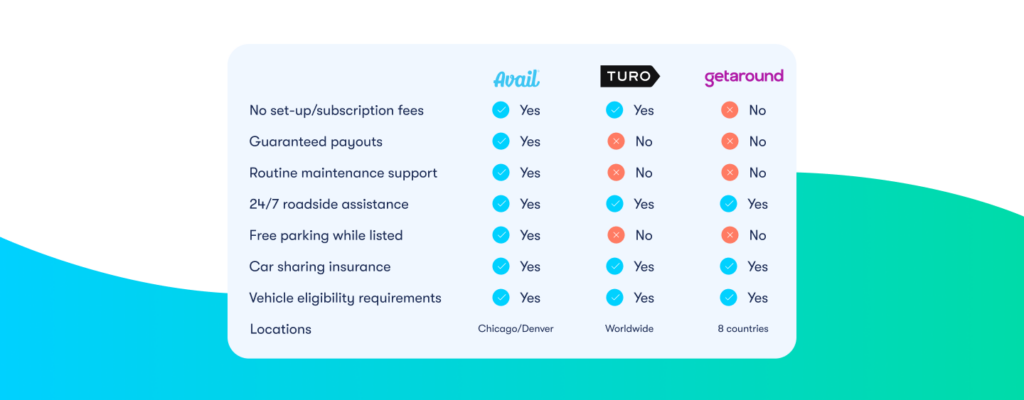

February 28, 2024
How to choose the best car sharing platform
As more people seek ways to offset the high cost of car ownership, car sharing platforms are becoming an increasingly popular choice. Renting out your vehicle through peer-to-peer platforms (P2P) simplifies the process and gives you a lot of flexibility, and car owners have their pick of P2P companies to choose from.
But not all are created equal in terms of car owner expectations, earning potential and non-monetary benefits. With so many car sharing companies operating today, how do you know which is best for you and your needs? This guide explores the ins and outs of three popular car sharing platforms. By the time we finish, you’ll be confident in your choice.
Top car sharing platforms
Most car owners tend to gravitate toward one of three major car sharing platforms: Avail, Turo and Getaround. Which one you favor might depend on several factors, including:
- Where you live
- The type and number of vehicles you want to share
- Your payout preferences
- Owner support services, such as maintenance and cleaning
We’ll dig into the details of each car sharing platform to help you make an educated decision about which will be best for you.
1. Avail
Avail car sharing operates in Chicago and Denver. However, if you aren’t local and want to share your car through Avail, they’ll help coordinate vehicle transportation to one of these cities so you can start sharing. Drivers who share their vehicle through Avail reap several benefits.
The most popular reason for choosing Avail is that it offers car owners guaranteed passive income. So if you list your car for sharing and it’s not booked by a driver at all, you are still guaranteed to earn $50 per week, or a prorated amount according to how many days your vehicle was available. Avail requires owners to list for a minimum of 5 consecutive days. You’re able to keep your car active on the platform for months at a time to get long-term payouts, and you can even check out your car if you need to use it. Of course, the guaranteed amount is just the minimum you’ll make when you use Avail. You’ll earn money each day your car is borrowed, so you have the potential to earn much more. And now, you can share a direct link to your vehicle page on social media or with friends and family and earn an extra $100 bonus each time a new borrower signs up using your link and completes a booking on one of your cars.
Avail’s other biggest selling point for car owners is how low-effort it is to use. Once you join and create an account, you just choose your sharing dates and location and then drop off your car and keys. Avail handles the rest, such as vetting drivers, promoting your vehicle on the platform, key exchanges, cleaning and refueling if necessary. You’re not required to buy or install any hardware, and you never have to meet or communicate with a borrower.
Every vehicle shared through Avail is protected by Allstate insurance as soon as it enters their care. If you’re concerned about wear and tear on your vehicle, Avail’s Car Care Plan shares costs to help you save on routine maintenance.
Every vehicle listed through Avail has to meet the company’s eligibility requirements. For example, all cars must be no more than 10 years old and have an automatic transmission, gas-powered or hybrid engine and fewer than 125,000 miles. Your car must have no open recalls, visible damage or significant maintenance issues.
Here’s an overview of what you can expect if you list your car on Avail:

While daily payout rates may be lower than other platforms (either $20 or $25 depending on the type of car you own), Avail’s flexibility, passive income and non-monetary benefits provide car owners with an option that is convenient and worthwhile.
2. Turo
Turo touts itself as being the world’s largest car sharing marketplace. The service is available in locations across the globe, including in several major cities. Turo’s biggest selling point for borrowers is that you can rent vehicles you may not find on other platforms, including fully electric and luxury sports cars. This is important to keep in mind because these are the types of vehicles that will perform best on this platform.
Instead of offering an easy way to make passive income, Turo differentiates itself as being a platform designed for aspiring entrepreneurs who want to build a scalable, multi-car business. Therefore, car owners (referred to as hosts) are expected to be more hands-on and manage details like accepting or rejecting booking requests, coordinating pick-up and drop-off with drivers (called guests) and inspecting and cleaning the car before and after each trip. Guests can leave a review for hosts, similar to Airbnb’s model, so Turo encourages its hosts to strive “to offer a five-star guest experience” every time. These additional responsibilities add up to a large time commitment, making this more akin to part-time or full-time work than an easy side gig.
Turo also has vehicle eligibility requirements, which include the car being no more than 12 years old (with some exceptions) and having fewer than 130,000 miles.
One primary consideration for prospective Turo hosts is its pricing structure. Turo lets its hosts determine their car’s rate and when to change it. However, your take-home earnings will be determined by which one of the five insurance protection plans you choose. If you want maximum protection in case of physical damage or theft with no deductible, Turo limits your earnings to 60% of the trip price. If you want to receive 90% of the trip price, you’ll need to take on a deductible of $2,500 and waive other protections, like loss of hosting income.
Here’s an overview of what you can expect if you list your car on Turo:

Here’s the bottom line: If you want more control over your earning potential or have a luxury vehicle to rent out, Turo can be an excellent way to make money. However, you need to be prepared to put in time to manage the logistics and provide a quality experience for guests or you risk a low rating and negative review, which will impact your future earning potential.
3. Getaround
Like Turo, Getaround has a presence in multiple countries, including dozens of cities across the U.S. Unlike Avail and Turo, however, Getaround charges car owners (called hosts) to use the platform. You’ll pay an initial $99 setup fee per vehicle and a monthly data subscription fee of $10 to $20 per vehicle to cover costs associated with the required proprietary hardware that’s installed in your car at onboarding. This electronic device is used for locking and unlocking the car, tracking its location via GPS and disabling the starter as an anti-theft feature.
Hosts are able to set their own rental rate, and Getaround takes a commission of 40%. Some markets offer a predictive pricing algorithm, which automatically sets the rate to an optimal amount based on variables like day of the week and trip duration, and fixed factors like the car’s year, make and model. Car owners who use Getaround also benefit from bonuses for referrals and sharing electric vehicles that are financed with Tenet.
Vehicle eligibility requirements are more generous than the other car sharing platforms. For example, cars need to be no more than 15 years old (subject to inspection) and have fewer than 200,000 miles, among other requirements.
A major downside to Getaround is that there isn’t a dedicated parking space for your car unless you pay for it. If you choose not to, then both you and your guests will need to find street parking for vehicle drop-off that is within a quarter mile of the car’s listed home location.
Another consideration is that hosts are responsible for communicating with guests, as well as making sure their vehicle is clean and well-maintained before the start of each trip. Like with Turo, guests are able to leave hosts a rating and review, so you’re incentivized to put in more effort to make their experience as good as possible. To help with things like cleaning, refueling, repairs and maintenance, Getaround offers partner discounts to its hosts, subject to market availability.
Here’s an overview of what you can expect if you list your car on Getaround:

This car sharing platform gives you the ability to set your own rate and allows older cars than the other competitors we covered. Getaround has a similar model to Turo in that it requires more effort by the host, from communicating with the guest to cleaning the car after each trip. This can be beneficial if you plan to build a business and want to generate positive reviews to attract bookings. It is the only one of the three that charges fees to its hosts, which will eat into your monthly earnings.
Comparing car sharing platforms side by side
Each of these three platforms offers different benefits to car owners, whether that’s Avail’s guaranteed earnings and low-effort sharing, Turo’s luxury vehicle market and more control over earnings or Getaround’s wider vehicle eligibility requirements. Compare the following details to see which P2P car sharing platform offers the benefits most important to you.

Selecting a car sharing platform
Choosing a car sharing platform isn’t just about the money, although that’s a big part. Your location, type of vehicle and comfort with risk all play a role, too. Ask yourself what you plan to achieve when you share your car with others. Are you simply looking for a way to use your vehicle to make money while on vacation? Do you want to turn this into a thriving business? Are you comfortable letting others drive your expensive luxury car?
If you want to earn passive income, you might choose a platform like Avail that trades higher earning potential with guaranteed income and minimal effort. On the flip side, budding entrepreneurs may want to work with a partner like Turo or Getaround that makes scalability a priority.
Consider using Avail for your car sharing business if you’re just starting out. Avail’s low barrier to entry, guaranteed payouts and flexibility offer a low-risk, high-reward way to test the waters as you learn more about car sharing. Read more about how car sharing with Avail works and download the app and sign up to explore how to get started.
Frequently asked questions about car sharing platforms
Is there an app like Airbnb but for cars?
Avail, Turo and Getaround are three car sharing platforms that function like Airbnb. Car owners share their vehicles through these platforms and drivers can borrow them when they need a car.
What are car sharing platforms, and how do they work?
Peer-to-peer (P2P) car sharing platforms help drivers share their vehicles with borrowers who need them. Users often download an app and create a profile to share or borrow cars. Drivers are screened before being allowed to make a booking, and car owners can only share their vehicle if it meets pre-defined eligibility requirements. Some of the most popular P2P car sharing companies include Avail, Turo and Getaround.
How do I decide which car sharing platform is the best fit for my needs?
You can determine which car sharing platform is a good fit for you by seeing which best aligns with your priorities. Are you more interested in making guaranteed easy money on the side? A platform like Avail may be best. Or are you hoping to build a larger business where you have more control over things like pricing and customer service? Turo or Getaround are worth considering. You’ll want to pay attention to pricing, insurance coverage, types of vehicles they allow and how often and how much they pay out after each booking ends to help inform your decision.
Borrow & share
Avail makes it simple to borrow a car when you need one, or share your car with others and earn money.





